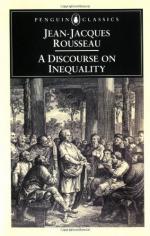
|
| Name: _________________________ | Period: ___________________ |
This quiz consists of 5 multiple choice and 5 short answer questions through Chapter 6, A Discourse on the Origin of Inequality, Appendix.
Multiple Choice Questions
1. What has added little to happiness in humans, according to Rousseau?
(a) The progress of arts and sciences.
(b) The progress of art.
(c) Wars.
(d) Government contol.
2. What does luxury generate according to "Chapter 2, A Discourse on the Moral Effects of the Arts and Sciences, Part II"?
(a) Social classes.
(b) Power.
(c) Greed.
(d) Time wasted.
3. According to Rousseau, what is the savage man of nature focused on?
(a) Self knowledge.
(b) Survival.
(c) Arts and sciences.
(d) Self preservation.
4. What type of state is Rousseau interested in having?
(a) One that is poor.
(b) One that is interested by conquest.
(c) One that is uninterested by conquest.
(d) One that is powerful.
5. According to Rousseau, what is the natural or physical inequality established by?
(a) Nature.
(b) Weather.
(c) Government.
(d) Society.
Short Answer Questions
1. What does Rousseau reflect on at the beginning of "Chapter 3, A Discourse on the Origin of Inequality, Dedication and Preface"?
2. What does Rousseau believe does not preserve one's liberty?
3. What does Rousseau say wise men do not chase?
4. According to Rousseau, why does science lead to war?
5. What leads to sex for man, according to Rousseau?
|
This section contains 230 words (approx. 1 page at 300 words per page) |

|




